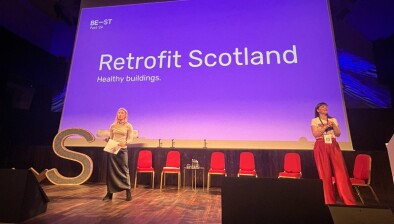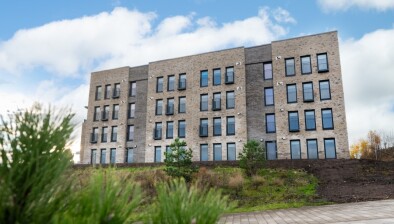Tara Schmidt: Can new financial models unlock retrofit at scale?

Tara Schmidt
Ahead of joining other industry leaders at this year’s International Retrofit Conference next week to explore how retrofit can move beyond isolated pilots to become financeable, scalable programmes, Tara Schmidt, executive director at Transition Finance Scotland, has outlined how to overcome some of the key blockers to retrofit through new financial models.
The International Retrofit Conference takes place each year as part of BE-ST Fest, a two-day industry summit focused on zero carbon construction.
Tara said: “Everyone talks about the cost of retrofit, but we need to focus on the benefits too. The Climate Change Committee estimates that we need £373 billion of additional capital expenditure across the UK between now and 2050 to decarbonise the built environment. We need to find new ways to finance this cost, or we are not going to be able to decarbonise our buildings at a scale which will allow us to access the wider benefits of retrofit.
“Finance can help by shifting the upfront cost of energy efficiency measures into bite-sized chunks,” explains Tara. “There are financial solutions out there, and if we use them, we can start focusing on what really matters: warmer homes, healthier people, and thriving communities.”
According to Tara, despite the diversity of opportunity, most Scottish and UK pension funds invest only around 5% of their assets domestically. “We know the future we want to unlock for the built environment, with comfortable, quality, affordable homes for citizens,” Tara said, “but we’re not yet using all the levers we have available to us to make it happen. Policy is incredibly helpful, but there’s a lot finance can do.”
The CCC has also estimated that the private sector will fund on average 65-90% of all decarbonisation investment from 2025 to 2050, highlighting the importance of private finance in addressing the current investment gap.
Transition Finance Scotland (TFS) has recently been integrated into the Green Finance Institute (GFI) to strengthen the links between Scotland and the wider UK to unlock investment in the green economy that will bring positive social and economic impact.
Why is retrofit so important?
TFS has chosen retrofit as a priority area because it connects climate, housing, and affordability. “If we’re going to transition properly, we need a demand-led approach. Heat is a massive contributor to carbon; we want to focus on how we move from natural gas to electrification while being as energy efficient as possible.”
“Retrofitting is also just a good thing to do. The benefits go far beyond reduced emissions. It saves energy and brings huge social benefits like warmer homes, lower bills, and better health,” Tara said.
From a financial perspective, a barrier to the uptake of retrofit is the high upfront costs. To tackle this issue, TFS and GFI are developing new ways to finance retrofit. One solution which is being investigated is Property Linked Finance.
Property Linked Finance (PLF) allows homeowners and property owners to access affordable, long-term funding for energy efficiency and environmental upgrades. The finance is attached to the property rather than the individual, so when a building is sold, the payment obligation transfers to the new owner. This means current owners pay only while they own the property or until the improvements are repaid, while new buyers benefit from a more energy-efficient, higher-value building and continue the payments. The model can be used for both residential and commercial properties.
PLF could support bridging this investment gap by providing a new funding mechanism to crowd in private capital. Research by the GFI has found that based on current appetite, PLF in Scotland could enable between £8.7-13.8bn of investment in the installation of low carbon technologies, energy efficiency and climate resiliency projects in Scotland’s built environment. The opportunity for PLF in Scotland’s residential market is valued at £4.5bn and for Scotland’s commercial property market, the opportunity is between £4.2-9.3bn.
The model has been used in the US for several years, and a pilot is now being explored in Scotland. There are legal hurdles to overcome, particularly around the Scottish Land Register, but work is underway to adapt the approach for both commercial and residential properties.
Tara is clear that innovation in finance must go hand in hand with education. “The other lever we need to pull to see retrofit successfully scale is both consumer education and financial education,” she says. TFS is already working with several retail banks in Scotland to build this knowledge among lenders. “People’s first question is always: how much is it going to cost?”, she highlights. “The education piece is about raising awareness of how we can make retrofit financially feasible for everyone.”
Archetypes, consistency, and financial models
A key barrier to investment in retrofit is that every project looks different. “At the moment, retrofit is too bespoke,” Tara explains. “That makes it really difficult to finance.”
TFS plans to build consistency by developing archetypes, meaning standard models for common types of housing and commercial buildings. “If we can build that consistency, we can match the right financial products to each archetype,” says Tara. “With this in place, someone can say, ‘I have this type of home. What are the options that make retrofit financially viable for me?’ And there will be a clear routemap.”
Attendees at the International Retrofit Conference will hear Tara share her ideas in a panel dedicated to examining approaches to enabling retrofit delivery at a city-wide scale, alongside other leading voices in the industry, including Angeline Robertson, from Hub West Scotland, Ryan Ferrier, from Kier, and Lizzy Westmacott, from ECD Architects.
BE-ST Fest is the culmination of a month-long festival celebrating the sustainable built environment. It brings together hundreds of professionals from construction and the built environment to showcase best practices and highlight emerging opportunities.
It takes place the 5th and 6th November at Paisley Town Hall - book your free ticket here.






